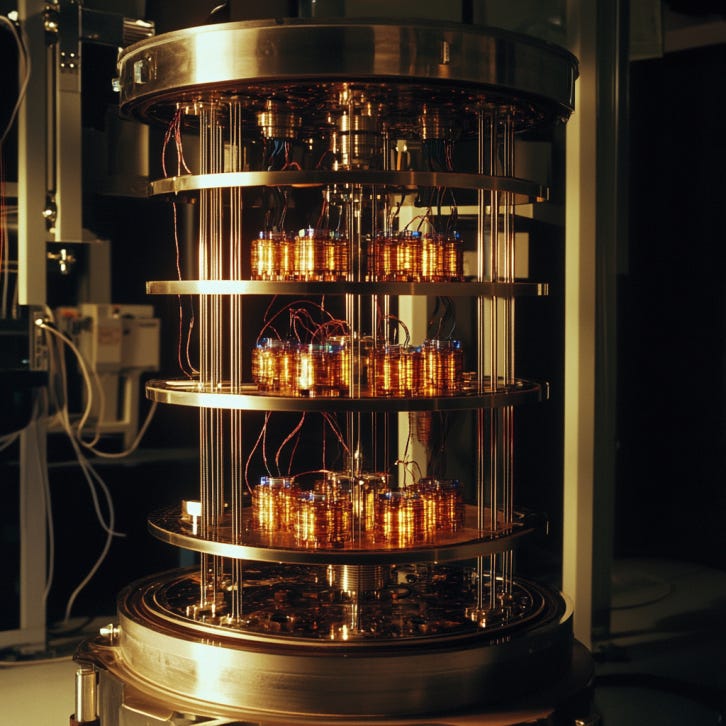Quantum Computing Stocks are in a Massive Hype Bubble (2025): IonQ, Rigetti (RGTI), D-Wave (QBTS), QUBT
Quantum computing stocks have gone parabolic from 2024-2025... but the hype doesn't align with reality; they are in a massive bubble.
Quantum computing stocks have gone absolutely parabolic this past year due to mainstream media hype. But how long can they keep riding the hype wave before the bubble bursts?
Anyone who logically analyzes these stocks will realize that the entire quantum computing sector is in a mega bubble - akin to crypto during bull market euphoria.
Perhaps the best comparison is random altcoin cryptos during a bull run… they appreciate rapidly in value due to perception and network effects - then the bubble bursts and people realize that Fartcoin wasn’t really going to revolutionize humanity.
I’m not implying that all quantum computing stocks are devoid of value (IonQ seems legit), but many are somewhat on par with Fartcoin, HarryPotterObamaSonicInu, Gigachad, MooDeng, and SkiMaskDog, etc. (yes these are real cryptos).
How did we reach this absurd level of “quantum computing stocks” hype?
We’ve been in a long-term bull market… portfolios are up big and everyone is hunting for the “next-big-thing” (i.e. the next NVIDIA, the NVIDIA killer, etc.) and anything adjacent to AI/robotics.
Macro conditions up to ~present were “risk-on” → $ pours into speculative investments → $ pours into niches/sectors that aren’t well understood (even by most investing in them) → price goes up → retail FOMO & social media hype → any favorable news (i.e. press releases, partnerships, etc.) continue fueling the bubble (negative news/criticism is mostly ignored).
Macro conditions: We are currently in a risk-on environment with many individual stocks with solid fundamentals achieving absurd valuations as a result of future AI/robotics hype (e.g. Palantir, Tesla, etc.). Quantum computing stocks have absurd valuations with zero fundamentals – the technology isn’t even used. This is akin to a crypto project during a crypto bubble – it’s likely to crash down if the macro conditions become risk-off.
Next NVIDIA, NVIDIA Killer, AI Chips: Many people genuinely believe quantum computing will be one of the following: the next NVIDIA, an NVIDIA killer, and/or be used in AI Chips (for advanced AI and robots). This goes to show that 99.9% of people fundamentally misunderstand quantum computing.
Realistic Use Cases for “Quantum”: Most people do not understand the specific use cases for quantum computing. There are legitimate and realistic use cases in cryptography, chemistry, advanced materials/drug discovery, finance, etc. - but current quantum computer tech is far from being useful in the real-world. It’ll eventually become useful, but this will be in 10-20 years (at the earliest). Thinking that quantum will power advanced AIs and robots soon is misguided and demonstrates an egregious misunderstanding of quantum computing tech.
Esoteric vibes: Many people see the word “quantum” and basically think it’s magic, mystical, dark matter, or has special superpowers. They don’t understand the difference between quantum computing and the pseudoscientific variant of quantum mechanics involving metaphysical beliefs, vibrations, karma, etc. (They’re thinking special “manifesting” via quantum powers or something).
Google Willow: Google issued a press release documenting a breakthrough their quantum computing chip dubbed “Willow.” This news spread rapidly within tech circles, leading figureheads like Elon Musk to give them props and Chamath to speculate that quantum could crack Bitcoin… this was like pouring gasoline on the mainstream quantum hype fire.
Going in heavy on quantum currently only makes sense if you’re doing it as a “network effect” type momentum trade wherein you think other sheep will see “quantum” and buy in… then once there’s a run-up you exit and take profits.
The idea that many are sheepish and willing to ape money into a technology they don’t understand because “AI needs quantum,” “NVIDIA killer,” and “price-go-up” (or some variation of this combo) is a valid premise in a risk-on environment.
A subset of quantum computing investors may be legitimately excited about the tech and bought-in very early (way before the current hype bubble). However, failure to take profits here is boneheaded… so if this was you, hopefully you took some money off the table before the crash down to reality.
Many will hold long-term or buy-in high (during/after the run-up) then end up frustrated with slow or sharp valuation declines (praying for quantum breakthroughs)… many will end up selling low once the jig is up.
The other issue with quantum stocks is that many public companies doing quantum computing are garbage… the only legitimate pure-play quantum computing company that I’d consider for investment is IONQ (I’d avoid others like the plague)… and even IONQ is ridiculously valued.
Even these companies must compete with formidable private quantum computing companies and wings of mega-cap tech companies e.g. Alphabet (Google), Microsoft, IBM, etc. with quantum divisions. You really think they can compete here? Unlikely.
Everyone wants the “next big thing” in their portfolio and they’ve opted for quantum. This reminds me of people who went into Bitcoin heavily 10 years ago (which was completely illogical as the government could’ve banned it and they’d have been screwed) or going in heavy on a crypto project on Ethereum because they’re hype about the potential: “it’ll revolutionize supply chains, gaming, finance, etc.” or something).
Related: Is Tesla (TSLA) Stock in a Bubble?
Related: Shorting Tesla is Pure Stupidity
Quantum Computing Bubble (Overview)
Quantum computing has captured investor imagination due to theoretical breakthroughs (e.g., Shor’s factoring, Grover’s search). However, commercial use cases remain limited. Many projects are in research or pilot stages, generating minimal revenue.
Hype vs. Reality: Industry experts, including NVIDIA’s CEO Jensen Huang, suggest “very useful” quantum computers are likely 15–20 years away. Despite that, public quantum stocks soared in 2024, with some up 1,000–2,000%.
Financials: Key quantum players (IonQ, Rigetti, D-Wave, Quantum Computing Inc.) show minimal revenue relative to multi-billion-dollar valuations.
Bubble Indicators: Extremely high Price-to-Sales ratios (often in the hundreds or thousands), repeated reliance on pilot or government deals, big negative free cash flow.
Short Thesis (?): Shorting quantum could be appealing if you believe the valuations are unsustainable given the decades-long commercialization horizon. However, timing is tricky due to frequent hype “breakthroughs” and the broader “risk-on” environment.
Quantum Computing in 2025: The Current State
Many haven’t bothered logically evaluating where quantum computing currently stands in the big picture (history to recent years to present, how fast its improving, etc.), legitimate high-probability real-world use cases (most think “AI, AI, AI”), and competitors from alternative forms of computing that may eat into its total TAM.
Timeline: How Far From Real-World Use?
Current Hardware: Typically in the tens of qubits (gate-model systems). Real commercial “advantage” requires thousands of error-corrected logical qubits.
NISQ Era: We’re in a “Noisy Intermediate-Scale Quantum” phase—useful for academic experiments and limited pilot projects, not large-scale production.
Jensen Huang’s Estimate: ~20 years for “very useful” quantum computers. Even the more bullish experts suggest 5–10+ years before wide-ranging commercial adoption.
Actual vs. Imagined vs. Future Use Cases
Actual Use Cases (2024–2025): Very limited pilot programs in optimization, cryptography research, small-scale quantum chemistry. Mostly proof-of-concept or government-funded.
Imagined: Routine machine learning acceleration, universal high-performance computing (HPC) replacement, breaking all encryption in the near term—these remain hype, given the hardware’s limitations.
Future Use Cases (Likely):
Encryption/Cryptography (Shor’s algorithm) eventually threatens current public-key cryptography.
Advanced chemistry/materials simulation.
Optimization for finance or logistics at scale—if fault-tolerant machines arrive.
Competitors & Alternatives
Classical HPC: Ongoing GPU, TPU, FPGA advances.
Photonic Computing: Leveraging light-based chips for HPC tasks.
Neuromorphic: Brain-inspired AI hardware with extreme energy efficiency.
Hybrid Approaches: NVIDIA GPU + Quantum Computer hybrids (via CUDA-Q). Cloud-based HPC plus specialized quantum accelerators (what IBM, Google, AWS are developing).
Quantum: GPU Replacement Myth & AI
No, quantum computers aren’t going to take out NVIDIA GPUs for AI anytime soon.
In fact, things like: custom ASICs, photonic computing, and/or neuromorphic computing have a much better shot at taking out NVIDIA over the next 10-30 years for AI - and even these have low odds.
Why Quantum Won’t Replace GPUs Anytime Soon
Data I/O Bottlenecks: Quantum machines handle “small data” best; scaling to huge AI datasets is not feasible in the near term.
Different Workloads: Most AI tasks revolve around large matrix multiplications, heavy training sets—GPUs are already highly optimized for that.
Hybrid Future: Even if quantum hardware matures, it’s widely expected to be an accelerator in highly specialized tasks, not a wholesale GPU replacement.
Past Quantum Hype & Subsequent Solutions
There were specific problems of the past that were thought to be only solvable with quantum computing.
Many of these problems were cracked with advances in standard computing and/or algorithmic breakthroughs.
History: Quantum was often touted as the only solution for certain optimization/chemistry problems—then classical HPC or better algorithms (e.g., advanced GPUs, approximate methods) solved them.
Example: “Quantum annealing” for optimization was overshadowed by specialized HPC solutions, advanced heuristics, or combinatorial optimization libraries.
Top 4 Quantum Computing Stocks of 2025 (Financial Snapshots)
Here are the four major “pure-play” quantum stocks, plus one “misnamed” firm:
1. IonQ (IONQ)
Market Cap: $6B+ (peak), still near multi-billion despite a partial pullback.
Revenue: Tens of millions ($38–$42M guidance for 2024).
Valuation: Forward PS ~150+; EV/Sales ~277.
Technology: Trapped-ion approach, considered academically robust, integrated into AWS, Azure, Google Cloud.
Pros: More actual revenue than peers, real partnerships.
Cons: Still burning cash, leaps away from large-scale quantum advantage.
2. Rigetti Computing (RGTI)
Market Cap: Peaked above $2B after a ~1,500% run; partially retrenched.
Revenue: ~$12M (declining YoY).
Valuation: Forward PS ~190–200.
R&D Focus: Superconducting qubits, direct competition with Google/IBM.
Cons: High burn, overshadowed by better-funded tech giants.
3. D-Wave Quantum (QBTS)
Market Cap: Surged from under $1 to $9–$10, dropped ~50% after Jensen Huang’s remarks, but still ~5–7× from lows.
Revenue: Under $10M (low growth).
Technology: Quantum annealers, heavily criticized as niche.
History: Over 25 years old, minimal commercial success.
Valuation: EV/Sales well above 100.
4. Quantum Computing Inc. (QUBT)
Market Cap: $1B+ at peak.
Revenue: Under $1M—barely any.
Valuation: Forward PS ~1,800 (among the highest in the entire stock market).
Tech: Photonic-based approach, focusing on pilot foundry services.
Cons: Likely the most glaring fundamental mismatch.
Which Quantum Stocks Are Likely in a Bubble (2025)?
All of them. Some like QUBT (Quantum Sciences Inc.) and D-Wave (QBTS) are likely in enormous bubbles - just analyze the financials, look at current use-cases, think about competition, logically infer when they’ll actually be used (if ever), etc. - the picture doesn’t look good.
Some have gone as far as to say these companies are mostly worthless… Rigetti (RGTI) and IonQ (IONQ) seem to have some legitimacy but are still in large bubbles. Of the 4, I’d be more hesitant to short IONQ due to its legitimacy - but it is still ridiculously overpriced.
Certain stocks with “quantum” in name only: Quantum (QMCO) and Quantum-Si (QSI) are being bought up heavily (likely by retail investors) despite having zero actual “quantum computing” involvement. (To be fair this could also be big $ guys trying to get ahead of retail assuming retail will pile in due to “quantum” in name and then they sell etc.).
QUBT: Possibly the largest mismatch.
D-Wave: Over two decades, still <$10M revenue, soared on intangible “quantum” mania.
Rigetti: Ongoing declines in revenue with 200+ forward PS.
IonQ: Also likely overvalued but the best fundamentals.
Quantum Sector: Overall, the entire quantum sphere appears overextended relative to near-term potential.
Jensen Huang’s (NVIDIA CEO) Take on Quantum Computing: CES 2025
Now I know some of the quantum kool-aid drinkers think that Jensen Huang has some hidden motive to discredit quantum computing companies because he’s afraid of the competition… this is comedic.
NVIDIA’s top dog understands quantum computing technology better than 99.999% of humanity… in fact, NVIDIA created CUDA-Q which integrates quantum compute with GPUs (because the near-term future for quantum is likely hybrid integration with NVIDIA GPUs).
NVIDIA would benefit (perhaps significantly) if quantum computing took off (in terms of legitimate usage) because they’d benefit from GPU-quantum hybrid hardware and CUDA-Q usage.
Jensen has his finger on the pulse of quantum computing and is constantly collaborating with quantum computing companies to improve the tech. Additionally, if he ever thought quantum might become a threat to NVIDIA, he’d just acquire a pure-play company OR form a quantum hardware unit with his world-class R&D team.
Legitimate “real-world” use cases for quantum computing are pretty far away even if we are being extremely optimistic.
Jensen Huang at CES 2025 predicts ~15 years at the earliest and ~30 years at the latest for quantum to be used to solve real-world problems and make a significant impact (sure there will be preliminary stuff, but we’re talking used heavily to solve problems).
Timeline: 20 years for “very useful” quantum computers (15 on the early side, 30 on the late side).
Current Constraints: “Good for small data,” limited by microwave communications, huge error rates.
NVIDIA Strategy: Hybrid quantum-classical (CUDA Q), but quantum is an accelerator—not a GPU replacement.
Market Reaction (Sell Off)
IonQ, Rigetti, D-Wave, QUBT each fell 30–50% in a few sessions after Jensen’s speech at CES 2025… people may be starting to wake up now that they’ve heard from a credible source. (Jensen does not feel threatened.)
This followed months of massive gains triggered by Google’s “Willow” progress PR announcement in Dec 2024.
Why It Matters
Huang is a credible computing figure; his sober timeline undercuts near-term hype from mainstream media and hype idiots.
Investors realized near-future revenue assumptions might be inflated.
Even after the drop, quantum valuations remain well above conventional fundamental benchmarks.
Is the Quantum Computing Industry/Sector in a Bubble?
Yes. Quantum computing is in a massive bubble (2024-2025). Sure we can argue over the definition of a “bubble,” the size of the bubble, etc. - but the financial metrics combined with lack of real world uses are screaming “bubble.”
Quantum computing zealots: “Well why don’t you short it then?” Just because something is in a bubble doesn’t make it smart to knee-jerk short stocks within the sector… timing matters.
These comments just show how people become so emotionally attached to stocks or sectors (e.g. quantum) that they turn animalistic toward anyone who suggests overvaluations (even if the logic/data/evidence is strong).
If the macro environment remains risk-on and we have people piling into quantum because they’re convinced these companies are the next NVIDIA killers or something - the bubble could go insanely high and make life difficult for shorters (even if the shorters are “right” about the bubble).
In many cases, stock prices can remain irrational for longer than shorters can remain solvent - even if the shorters are accurate in their assessments.
Classic Bubble Indicators
Extreme Multiples: Forward PS in the dozens or hundreds (IonQ, Rigetti, D-Wave) or even thousands (QUBT).
Minimal Revenue: Single- to low-double-digit millions in best cases, near-zero for QUBT.
No Path to Profitability in the next few years, possibly a decade+ away.
No heavy real-world use: There is no quantum technology that is currently being used heavily in the real-world. It’s all speculative, research, and testing.
Retail Speculation: “Quantum” hype on social media, large short-squeeze potential, reminiscent of dot-com mania or 2021 meme stock euphoria.
Macro Backdrop (2025): How It Affects Quantum
The macro conditions are how quantum computing stocks ended up in a bubble - along with other sectors and specific names (e.g. Tesla).
Current Conditions
GDP: ~2–3% growth, healthy consumer spending.
Fed Rates: 4.25–4.50%, moderate inflation ~2.7–3.3%.
Stock Market: Elevated P/E ratios, Shiller CAPE near 38.6, bullish sentiment.
Credit Spreads: Historically tight, signifying high risk appetite.
Implications for Speculative Tech
As long as liquidity is ample and “risk-on” persists, quantum stocks can maintain elevated valuations.
If inflation re-accelerates or the Fed signals further tightening, these unprofitable “long-duration” plays often drop disproportionately.
A broad market correction could quickly “pop” quantum’s bubble.
Shorting Quantum: Is It Smart & Which Targets?
Disclaimer: Nothing here is financial or investment advice.
I think there is a reasonable case to be made that a short position in certain names (e.g. QBUT, QBTS, etc.) could pay off managed effectively.
That said, I could envision someone shorting a quantum stock, the market turning risk-on due to some new news, and quantum stocks skyrocketing - causing some shorters to panic.
You need a strategy and high conviction if you plan on shorting.
Related: 4 Overvalued Quantum Computing Stocks & Short Strategy (2025)
Estimated Odds of Paying Off
Fundamental Logic: Very strong—valuations are far out of line with actual or even 5-year future revenues.
Timing Risk: Bubbles can inflate longer than expected, especially in a bullish market. Frequent hype press releases can trigger short squeezes.
Best Targets
QUBT: The biggest mismatch; negligible revenue, huge multiple.
D-Wave (QBTS): 25 years, barely any traction, overshadowed by gate-model.
Rigetti (RGTI): Declining revenue, overshadowed by stronger superconducting giants.
IonQ (IONQ): Overvalued but has the strongest fundamentals—less extreme bubble.
QMCO: Not truly a quantum HPC stock, so less of a direct short candidate for “quantum bubble” reasons.
Final Thoughts: Quantum Computing is in a Massive Bubble (2025)
Long-term (~20 years from now), I think quantum will likely have evolved into a reasonably strong industry with significant TAM.
It has legitimate innovative use cases (e.g. optimizations, chemistry, advanced materials, cryptography, finance/logistics, etc.) - and could help with AI in some capacity (in the far future).
Quantum computing stocks are in a major bubble right now. Even if you “believe in quantum computing technology,” there is no compelling reason to assume that any public “quantum” pure-play companies will end up winners vs. the likes of Alphabet (Google), IBM, Microsoft, Honeywell, et al. or private companies.
As I’ve said, the only pure-play public quantum computing company that seems solid is IONQ - and even they are absurdly overvalued.
Commercially, quantum computing remains far from mainstream—most experts say a 10+ years (at the earliest) and up to 30 years (at the latest) for the technology to be used in the real-world. (Jensen says 15-30).
Valuations of certain public quantum stocks reflect an immediate revolution that isn’t happening yet. (Some have a Forward P/S ~1800). These are comically high.
Bubble: The quantum sector remains in bubble territory despite recent pullbacks. Even after the sell-off post-CES 2025, they are still bubbled up.
Shorting?: The idea of shorting quantum stocks is compelling but not necessarily easy. You need to consider the macro backdrop if you plan on this and be cautious - bubbles can grow larger than expected if things become heavily risk-on again.
Bottom Line: Quantum computing has immense long-term potential. Yet most current “pure-play” quantum stocks are priced for near-term breakthroughs that industry veterans (like Jensen Huang) say are still 15-30 years away. This mismatch offers a potentially attractive short opportunity—assuming disciplined risk management and a watchful eye on market sentiment.













